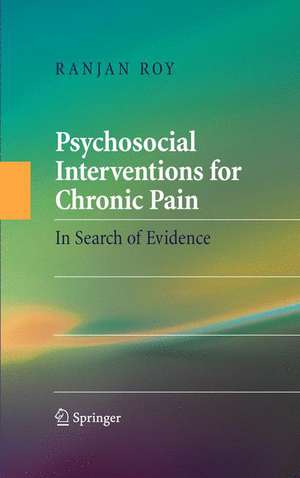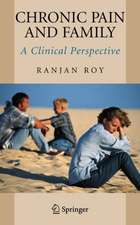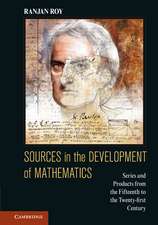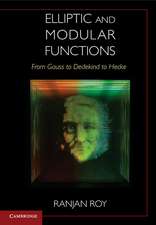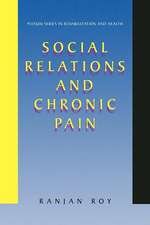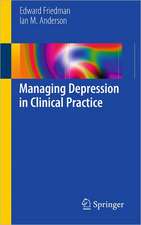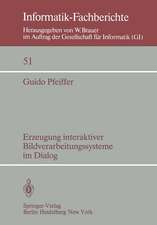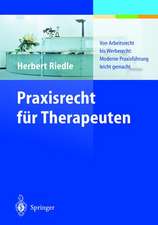Psychosocial Interventions for Chronic Pain: In Search of Evidence
Autor Ranjan Royen Limba Engleză Hardback – 25 aug 2008
This book will (1) provide empirically derived support and understanding of psychosocial problems encountered by patients and (2) explore the efficacy of the interventions available for patient care. Chapter 1 will take a historical view of the development of evidence-based practice in medicine and psychology. Chapter 2 will examine the concept of empirically supported evidence, ie, the extent to which the impact of psychosocial problems on health has been measured. The remaining eight chapters will explore a range of psychosocial issues through case illustration and examine both the problems and their management from an evidence-based approach. This book is a departure from reports on evidence-based practice to the extent that the empirical bases of the problems reported, and not just their treatment, are subjected to scrutiny.
| Toate formatele și edițiile | Preț | Express |
|---|---|---|
| Paperback (1) | 1277.86 lei 6-8 săpt. | |
| Springer – 29 oct 2010 | 1277.86 lei 6-8 săpt. | |
| Hardback (1) | 1282.26 lei 6-8 săpt. | |
| Springer – 25 aug 2008 | 1282.26 lei 6-8 săpt. |
Preț: 1282.26 lei
Preț vechi: 1349.74 lei
-5% Nou
Puncte Express: 1923
Preț estimativ în valută:
245.39€ • 255.25$ • 202.58£
245.39€ • 255.25$ • 202.58£
Carte tipărită la comandă
Livrare economică 14-28 aprilie
Preluare comenzi: 021 569.72.76
Specificații
ISBN-13: 9780387762951
ISBN-10: 0387762957
Pagini: 177
Ilustrații: XIII, 177 p.
Greutate: 0.39 kg
Ediția:2008
Editura: Springer
Colecția Springer
Locul publicării:New York, NY, United States
ISBN-10: 0387762957
Pagini: 177
Ilustrații: XIII, 177 p.
Greutate: 0.39 kg
Ediția:2008
Editura: Springer
Colecția Springer
Locul publicării:New York, NY, United States
Public țintă
Professional/practitionerCuprins
Evidence-Based Approach and Psychosocial Practice.- Psychosocial Problems and the Chronic Pain Sufferer.- Family Therapy and Couple Therapy.- Abuse, Chronic Pain and Psychodynamic Psychotherapy.- Interpersonal Psychotherapy.- Grief Therapy.- Brief Therapies.- Cognitive Behavioral Therapy.- Group Therapy.- Multidisciplinary Approach and Chronic Pain.- Epilogue.
Recenzii
From the reviews:
"Ranjan Roy’s Psychosocial Interventions for Chronic Pain: In Search of Evidence is a book that’s largely about these correlates of pain and the psychosocial methods used to treat them. … Readers who take a broad approach to pain will find plenty here to inform their thinking and clinical activities. … Clinicians should use the best available evidence in developing treatment programs for specific individual patients. … If we follow his advice, our patients will benefit." (Alan G. Glaros, PsycCRITIQUES, Vol. 54 (31), August, 2009)
"Ranjan Roy’s Psychosocial Interventions for Chronic Pain: In Search of Evidence is a book that’s largely about these correlates of pain and the psychosocial methods used to treat them. … Readers who take a broad approach to pain will find plenty here to inform their thinking and clinical activities. … Clinicians should use the best available evidence in developing treatment programs for specific individual patients. … If we follow his advice, our patients will benefit." (Alan G. Glaros, PsycCRITIQUES, Vol. 54 (31), August, 2009)
Notă biografică
Ranjan Roy is Professor of Social Work and Clinical Health Psychology, Faculty of Medicine, University of Manitoba. He is also a Consultant (Scientific) in the Department of Anesthesia, St. Boniface Hospital, Winnipeg. He is a Fellow of the Royal Society of Canada and the Canadian Academy of Science and Humanities, and is renowned as a researcher and lecturer on the biopsychosocial aspects of chronic pain.
Textul de pe ultima copertă
Psychosocial Interventions for Chronic Pain
In Search of Evidence
Ranjan Roy, University of Manitoba, Winnipeg
Although much of medical practice is research driven, the same cannot be said about the psychosocial interventions for chronic pain and illness. Psychological therapy for pain is dominated by cognitive-behavior therapy, which is demonstrably effective in a significant proportion of chronic pain sufferers. There is a clear need to broaden the base of psychosocial therapies for treating this hugely suffering population. Psychosocial Interventions for Chronic Pain goes a long way to correct the situation by examining the empirical bases of patient problems as well as offering evidence-supported approaches to their management. Ranjan Roy’s introductory chapters explain how effectiveness is measured in psychosocial practice, and these concepts are clearly applied in compelling case examples, including:
In Search of Evidence
Ranjan Roy, University of Manitoba, Winnipeg
Although much of medical practice is research driven, the same cannot be said about the psychosocial interventions for chronic pain and illness. Psychological therapy for pain is dominated by cognitive-behavior therapy, which is demonstrably effective in a significant proportion of chronic pain sufferers. There is a clear need to broaden the base of psychosocial therapies for treating this hugely suffering population. Psychosocial Interventions for Chronic Pain goes a long way to correct the situation by examining the empirical bases of patient problems as well as offering evidence-supported approaches to their management. Ranjan Roy’s introductory chapters explain how effectiveness is measured in psychosocial practice, and these concepts are clearly applied in compelling case examples, including:
- Family and couple therapy for longstanding pain issues.
- Psychodynamic psychotherapy in a case of abuse and chronic pain.
- Interpersonal psychotherapy for identity issues following a hysterectomy.
- Cognitive-behavioral therapy for "immobilizing" pain.
- Grief therapy following catastrophic loss.
- Multidisciplinary approaches to complex chronic pain.
Caracteristici
The first book to systematically explore the evidence-based effectiveness of interventions offered to chronic pain sufferers. Oxford University, a leader in evidence-based medicine, now has a master’s program in evidence-based social work, the only one of its kind.
